At just 17 years old, Lurata Lyon was snatched off the streets in a war-torn Serbia by a brutal human trafficking gang.
One moment, she was a bright young teen with dreams of becoming a doctor like her father and the next she had vanished into the shadows of war – silenced, and sold by traffickers who saw her not as a person, but a commodity.
What followed was a descent into a nightmare most would not survive: months in solitary confinement being raped, beaten and branded by her captors.
Now a leading campaigner against human trafficking and modern slavery, her story stands as a powerful testament to endurance, faith, and the strength it takes to rebuild.
Born an only child to a loving couple in a small village in Serbia called Veliki Trnovac, Lurata remembers a home not of privilege, but of happiness: ‘I didn’t grow up with lots, but we were really rich in love.’
Her father, a doctor who would often worked for free for the local community and her mother, warm and watchful, kept their small household united: ‘We were the Three Musketeers,’ she lightly laughed, ‘that was our kind of wealth.’
A keen student, Lurata grew up dreaming of becoming a doctor, inspired by her father: ‘He was never about the money,’ she says with a smile, ‘he just wanted to help people. That was his calling. And I thought, when I grow up, I want to be like him.’
But fate had other plans.
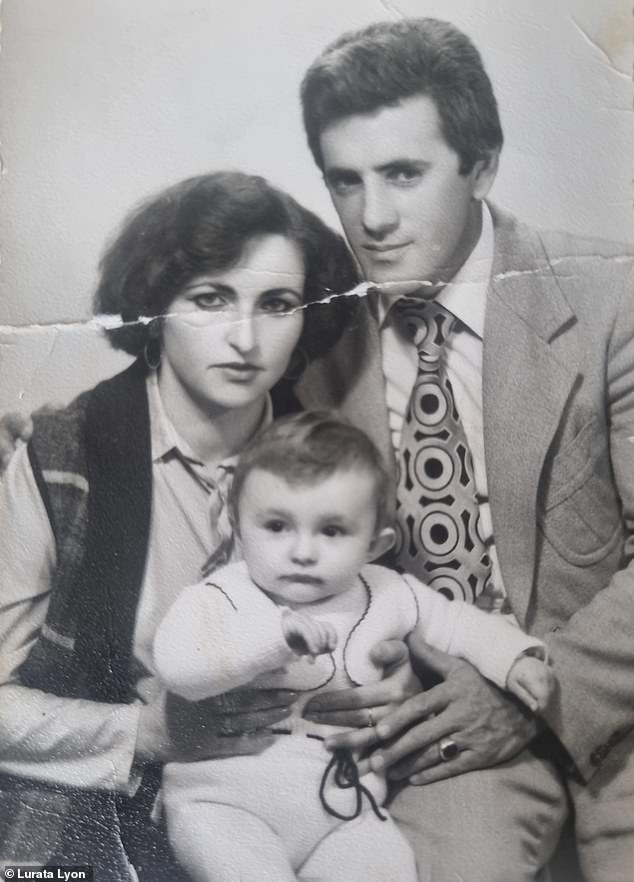
Born an only child to a loving couple in a small village in Serbia called Veliki Trnovac, Lurata remembers a home not of privilege, but of happiness. Pictured: Lurata with her parents

At just 17 years old, Lurata Lyon was snatched off the streets in a war-torn Serbia by a brutal human trafficking gang
In the early 1990s, Yugoslavia began to fracture violently along ethnic lines, and within a decade would become six separate states, known today as Slovenia, Croatia, Bosnia and Herzegovina, Montenegro, Serbia, and North Macedonia.
But these years were notoriously marked by depraved war crimes of genocide, ethnic cleansing, and mass wartime rape.
‘We knew something was coming,’ she recalls, ‘there were signs. You hope war never comes to your doorstep. But it can, in a split second.’
By the time Lurata was 17, those cracks had split wide open. Schools closed, police curfews were enforced, and the quiet life she’d always known slipped away.
Her father had heard that their village was earmarked to be massacred as part of an ethnic cleanse of the region, as such begged her to flee through the mountains, to the Red Cross who he believed could protect her.
Thankfully for their village, Lurata’s wealthy uncle bribed the men who came to kill them, handing over everything he owned in order to spare their lives.
However, still fearful of what was coming, Lurata argreed to leave the village and alone, at 17, she trekked through the mountains to Kosovo in search of the Red Cross.
Exhausted, dehydrated and having no idea where to go next, she sat down outside of a pub, unbeknownst to her that she was out past curfew and was risking being shot for such an offence.
Moments later she was approached by two American police officers, part of the international peacekeeping force, and a translator. Their names were Brian and Peter.
‘They came out with a translator and started questioning me – what I was doing on the streets, where I was from. I told them the truth: I was from Serbia.’
A dangerous admission in the middle of Kosovo during wartime.
Little did she know then this was the start of a lifelong friendship: ‘They treated me like their own. They gave me safety when I had nothing.’ Brian and Peter offered her shelter, fed her, gave her blankets and a sofa to sleep.
She stayed with the two men for what she recalls as a few months, helping out around the house and waiting for them to secure her safe passage to the Red Cross.
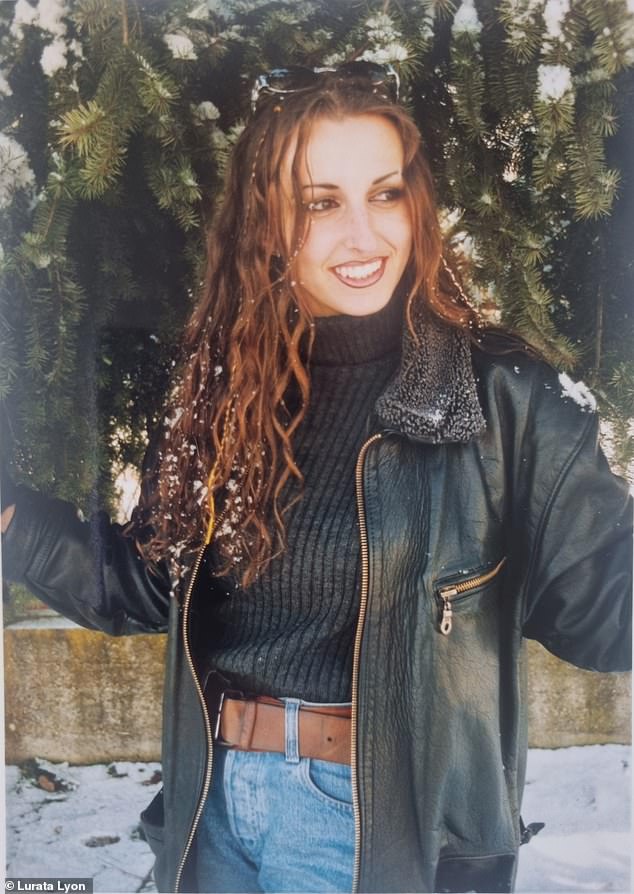
By the time Lurata was 17, those cracks had split wide open. Schools closed, police curfews were enforced, and the quiet life she’d always known slipped away. Pictured: Lurata aged 17
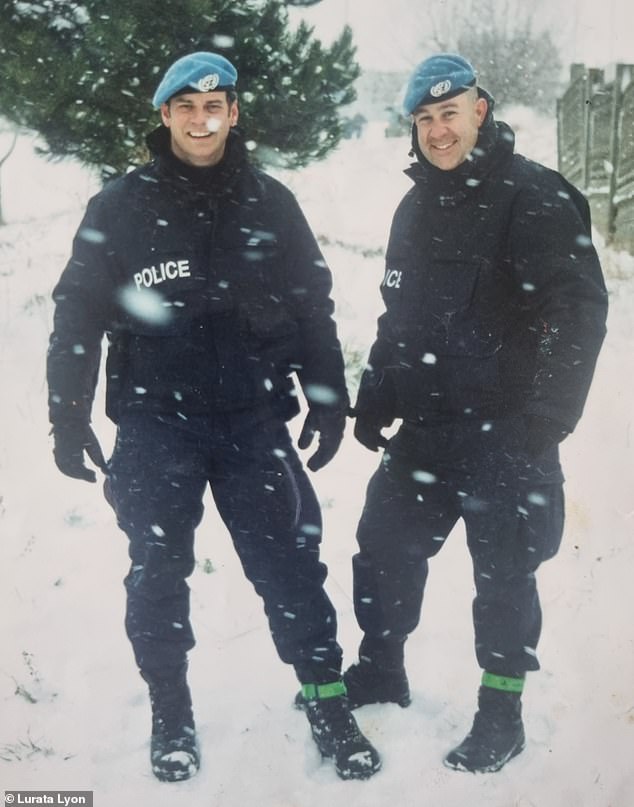
Brian and Peter (above) offered Lurata shelter, fed her, gave her blankets and a sofa to sleep on
But safety was fleeting. One day, bored, she thought she could risk going outside along to buy a newspaper.
Although the stand was just over the road, within seconds of stepping outside the house, a van pulled up alongside her. She had a bag put over her head and was thrown into the back.
Now reminiscing she declares: ‘They were waiting for me. We later pieced it together – the translator who had helped me speak to Brian and Peter had told people there was a Serbian girl living with two Americans. That should have been confidential information.’
She continued: ‘After a short drive, we arrived at some place, but I couldn’t see anything clearly at first.
‘They dragged me inside and threw me into a room. There was a man sitting at a table. He looked at me and said, ‘She’s the one.’
‘I remember thinking, What do you mean, the one? I wasn’t anyone special. I tried to plead with them, tell them they’ve made a mistake and to let me go.
‘But they started accusing me of being a spy. I was 17 years old. A spy? I couldn’t understand what was happening.
‘Then the boss said something that changed everything: ‘Flip her over and rape her. I want to watch.”
Gripped by the terror of what might happen next Lurata began to scream that she was a virgin, not knowing that this would make her even more precious ‘cargo’ to these depraved men.
After finding out this knowledge, she was spared the torment then as now they would be able to fetch a higher price to ‘sell her to the highest bidder’.
‘During that time, I was being groomed – trained in how to behave, how to ‘please.’ They made me watch horrible things. The boss and his partners abusing other girls. They forced me to watch, to learn.
‘There was one I remember vividly. She was unconscious and being abused. I’ll never forget it. That broke me. What they did to her – I will carry it with me forever.’
She was eventually sold and it meant she had to be moved, however when the traffickers tried to cross into Albania, Italian troops turned them away.
As such the boss decided she was ‘more trouble than she is worth’, saying ‘rape her do whatever you want to her and then get rid of her.’
Panic stricken she began to beg the man she had been left with if she could pray.
‘I hadn’t prayed in a long time, and I knew I’d made a lot of mistakes in my life. So the prayer came from desperation. I was preparing to die.
‘I said, ‘Let’s do this in a dignified way. You’re Muslim, I’m Muslim too – I was raised that way. Please, can we just do this kindly? I’m so scared. I know I’m about to die, but don’t send me off like this.’
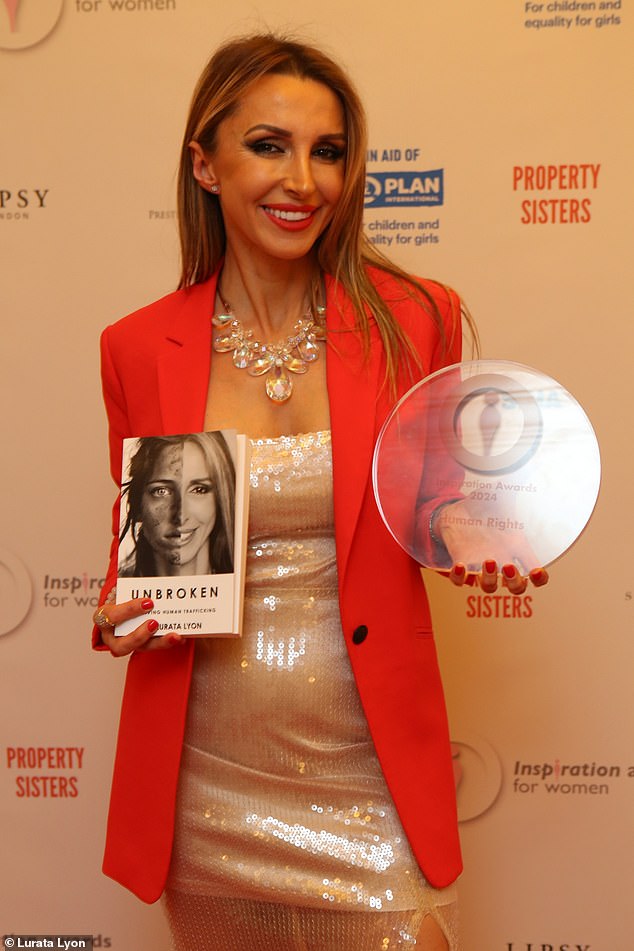
Now in her 40s, Lurata has built a life far beyond mere survival. She is a wife, a mother, and a trauma recovery expert who helps others through their own healing journeys. Pictured winning the Human Right Awards in London
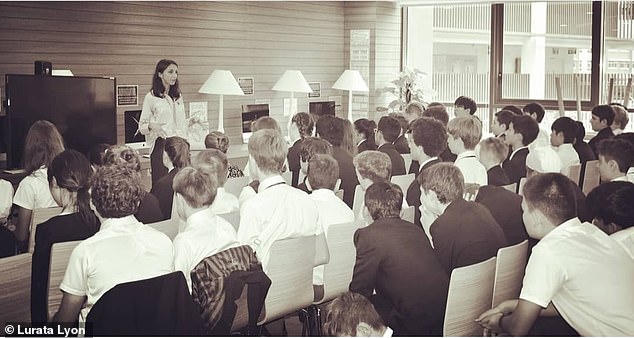
Lurata speaking to school pupils, as she is now a leading campaigner against human trafficking and modern slavery
To her surprise, the man paused. Instead of carrying out the order, he allowed her to pray and went into the bathroom.
But as she recited her final prayers, filled with sorrow and guilt, Lurata experienced what she describes as an inner voice that saved her life.
‘I was weeping inside. I was saying, ‘I’m so sorry, Mum and Dad. I’ve let you down. You’ll never know where I am.’ And then I heard a voice in my mind. It said: ‘Turn around.’
She hesitated. In her faith, prayer is sacred and not to be interrupted. But driven by something unknown she turned.
‘On the table were the gun and a ring of keys. I looked at both and didn’t know what to do. But then I felt this surge of courage. I got up, looked again, grabbed the keys and ran.’
The escape was far from over. Lurata ran to the apartment door, only to face two locked barriers: a wooden door and a second layer of metal security bars.
‘I opened the wooden door, but the metal one wouldn’t open. I was fumbling, panicking, trying every key. I was frantic. And then—somehow—I managed to unlock it.’
She burst out of the apartment in a frenzy, but her captor was not far behind. Just as she reached the street-level door, she was attacked.
‘I heard him behind me. His footsteps getting closer – faster – and then bang – he punched me right in the face. So hard that I flew into the street.’
Lurata hit the pavement dazed, struggling to understand what was happening. Then she saw it – a parked Jeep. It appeared empty, until her desperate screams summoned a figure from the shadows.
‘I started screaming. And, by some miracle, it turned out to be a UN police officer who had just finished his shift.’
The officer ran to help her, but her captor returned with the gun and opened fire. Thankfully the officer had time to radio in for back-up and within moments, UN vehicles surrounded the scene.
With nowhere else to go, Lurata told them she had previously stayed with two American police officers, Peter and Brian. Police managed to contact Peter, who came immediately.
But unable to stay with the pair she made the decision to return to her parents home in Serbia, so she retraced the same mountain route she had taken months earlier.
However her reunion with her family was far from joyful. What she expected to be a heartwarming return quickly turned into confusion and despair.
‘My mother wasn’t happy to see me – she cried and screamed, ‘You shouldn’t have come back!’
She had been spotted coming back into Serbia and and followed home. Soon after, soldiers arrived to arrest her.
At first, Lurata didn’t feel threatened. She assumed they were part of her own national army – protectors, not predators.
But these weren’t trained professionals, instead they were crazed vigilantes who preferred to take matters into their own hands.
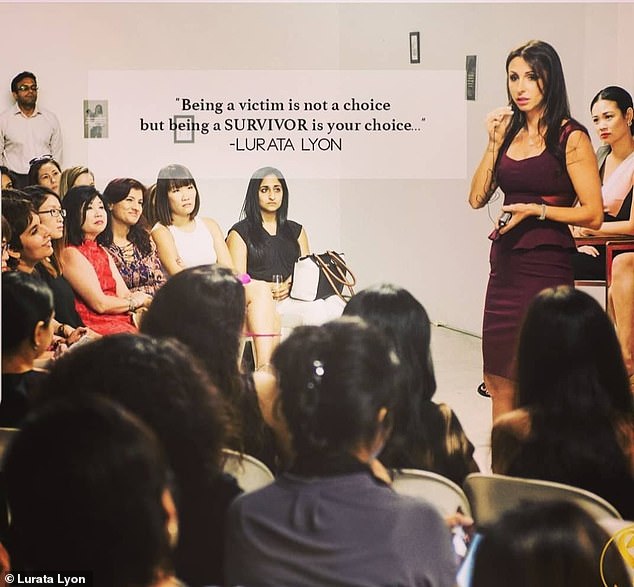
Lurata speaking at events, saying ‘Being a victim is not a choice but being a survivor is your choice…’
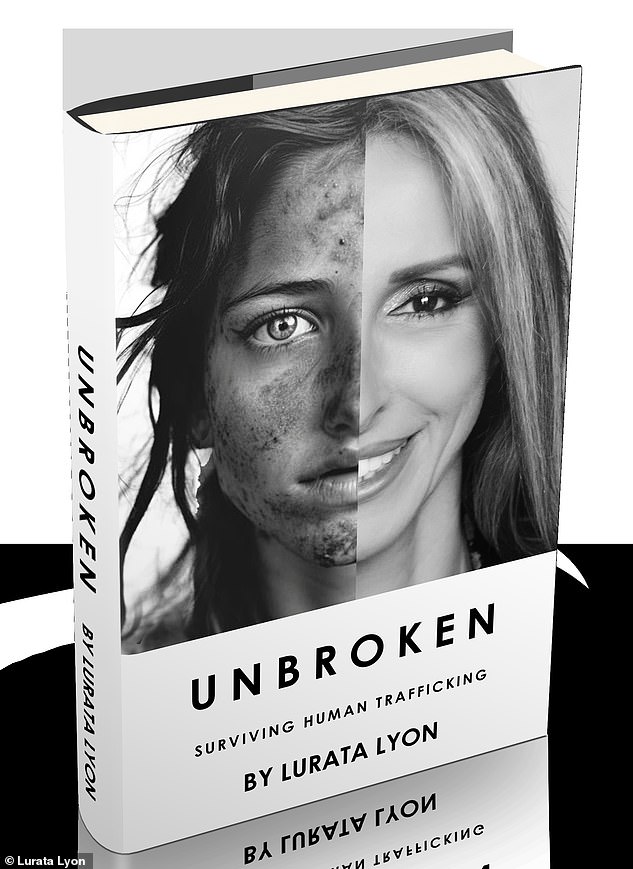
Her novel about her experiences before she came to the UK
‘You could tell who was real and who wasn’t by the shoes,’ she said. ‘The ones with trainers came for me. I told my parents, ‘Don’t worry, I’ll explain what happened. They’ll release me.’ I was so naïve.’
As she was led away, her mother screamed in the garden, restrained only by her father.
She was taken to an abandoned building high in the mountains, which had been converted in to a secret interrogation site.
‘At first, it was just normal questioning,’ she recalled. ‘But as it went on, it got more and more intense. They wouldn’t believe me. I kept telling them the story, but they became so frustrated that they started beating me.
‘I lost teeth, my jaw was dislocated, and my ear was ripped from the power of the blows.’
Then in a final attempt to get her to ‘confess’ to crimes she had not committed they scarred her for life.
‘They branded me. That’s when I blacked out. The pain was so excruciating, I don’t remember much after that. I just woke up in a small, dark room.’
When she woke, her eyes were swollen shut. She was still bleeding and so confused and disoriented, she believed she had been buried alive.
‘The room was so dark, I started screaming and scratching the walls, banging on the door. I thought I was underground. I panicked for hours. But eventually, I gave in. I was exhausted – from the beatings, the infections. I just didn’t have anything left.
‘There was no comfort. Just a blanket on the floor. The smell was awful. I tried everything to stay warm. That little space became my whole world.’
For the next six months Lurata was held in that dungeon without proper food, daylight or warmth.
‘I was being sexually abused daily – multiple times a day. They gave me some kind of soup, but I stopped eating. I wanted to die. I didn’t want to survive anymore.
‘I starved myself. I tried everything I could to die. But nothing worked. I’d given in to the darkness.’
Eventually, Lurata dissociated from her own body and experience, fearing that she would never get out of that hell.
‘During one of the abuses, I was just a body that didn’t feel anything anymore. I think I got used to the pain. And I started thinking about them -those people doing this to me. What made them so evil? What happened to them as kids? Were they abused too?
‘I actually felt sorry for them.’
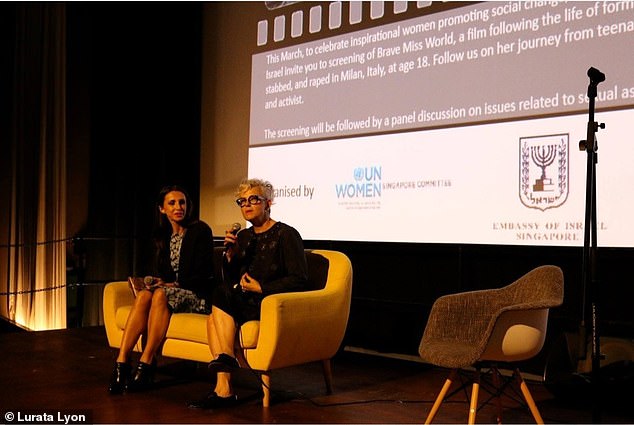
Lurata eventually became a British citizen in 2005, and then in 2007, her parents were finally able to visit her in the UK for the first time

Even recently launching a wellness retreats in Spain to guide others through physical, mental, and spiritual recovery
And then, a miracle: her father managed to track her down and bribed the men to allow her to come home, just for 24 hours, to see her, to clean her up, and, ultimately, to plan her escape.
‘He wasn’t worried about the repercussions. He’d already planned for both him and my mum to be executed if it meant saving me. They had accepted the risk.’
On the night of her rescue, there was no time for full goodbyes. Just the haunting knowledge that she would never see them again.
‘He told me to say goodbye to my mum. That was when I knew. They had made peace with it. Any parent who loves their child would do the same, I think.’
Later that night, she was hidden in a truck and sent away. Her parents stayed behind to face the consequences.
A few weeks later she would arrive in the UK, just 18 years old, with the legal status of a political asylum seeker.
Years after escaping war and torture Lurata finally received a phone call she had been waiting for. It was her mother.
Both her parents had survived the war, but had endured their own horrors for their ‘crimes’.
Lurata eventually became a British citizen in 2005, and then in 2007, her parents were finally able to visit her in the UK for the first time.
Now in her 40s, Lurata has built a life far beyond mere survival. She is a wife, a mother, and a trauma recovery expert who helps others through their own healing journeys.
Even recently launching a wellness retreats in Spain to guide others through physical, mental, and spiritual recovery.
Despite all her hardships her final message was one of gratitude: ‘I’m very grateful to the British government for what they did for me. I thank every taxpayer in every speech I do.
‘The money they contributed gave me access to doctors, psychiatrists, medication, operations – everything I needed. I’m forever grateful.’












